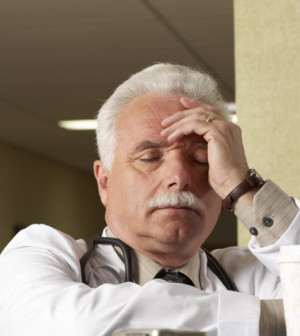- Could Your Grocery Store Meat Be Causing Recurring UTIs?
- Are You Making This Expensive Thermostat Error This Winter?
- Recognizing the Signs of Hypothyroidism
- 10 Strategies to Overcome Insomnia
- Could Artificial Sweeteners Be Aging the Brain Faster?
- Techniques for Soothing Your Nervous System
- Does the Water in Your House Smell Funny? Here’s Why
- Can a Daily Dose of Apple Cider Vinegar Actually Aid Weight Loss?
- 6 Health Beverages That Can Actually Spike Your Blood Sugar
- Treatment Options for Social Anxiety Disorder
FDA Approves New Kind of Insomnia Drug


A new prescription insomnia drug that’s the first of its kind was approved by the U.S. Food and Drug Administration on Wednesday.
Belsomra (suvorexant) tablets are approved to treat patients with insomnia, which means they have difficulty falling and staying asleep.
The new sleep drug is called an orexin receptor antagonist and it works by altering the action of brain chemicals called orexins, which help regulate the sleep-wake cycle and also help keep people awake.
“To assist health care professionals and patients in finding the best dose to treat each individual patient’s sleeplessness, the FDA has approved Belsomra in four different strengths — 5, 10, 15 and 20 milligrams [mg],” Dr. Ellis Unger, director of the Office of Drug Evaluation I in the FDA’s Center for Drug Evaluation and Research, said in an agency news release.
“Using the lowest effective dose can reduce the risk of side effects, such as next-morning drowsiness,” he added.
Belsomra should be taken only once a night, within 30 minutes of going to bed, and with at least seven hours remaining before the planned time of waking. The total dose should not exceed 20 mg once daily, the FDA said.
The drug’s approval was based on the findings of three clinical trials that included more than 500 people, the agency said. The results showed that people who took Belsomra fell asleep faster and spent less time awake during the night than those who took a placebo.
Belsomra was not compared to other insomnia drugs, so it’s not known if there are differences in safety or effectiveness, the FDA said.
The agency asked Belsomra maker Merck, Sharpe & Dohme Corp. to study next-day driving performance in people who had taken the drug. Both men and women had impaired driving skills when they took the 20-mg dose, which means that people who take that maximum dose should be cautioned to avoid driving or other activities that require full mental alertness the next day, the FDA said.
Even those who take lower doses should be cautioned about possible sleepiness the next day, because individuals have different sensitivities to drugs, the agency noted.
More information
The U.S. National Library of Medicine has more about insomnia.
Source: HealthDay
Copyright © 2026 HealthDay. All rights reserved.










